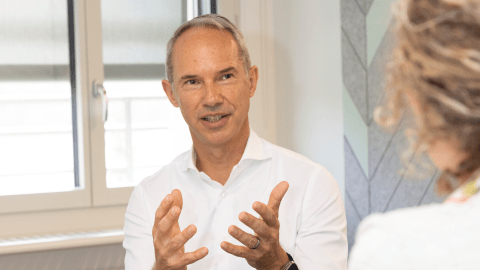As global superpowers pour billions into AI, Switzerland takes a different route - decentralized, innovative, and surprisingly effective. From Crypto Valley to ETH Zurich, the Swiss model proves that smart strategies and grassroots collaboration can rival even the most powerful tech nations. It is a revealing look into one of the world’s most underestimated innovation hubs.
About the author:
Alexander Brunner founded Brunner Digital, a tech ecosystem consultancy with clients in the US, Europe, and Asia. He is the President of Home of Blockchain.swiss.

The big Swiss AI secret
The launch of ChatGPT 3.5 in November 2022 sparked a global race for artificial intelligence (AI). The United States took the lead, investing hundreds of billions of dollars in AI infrastructure. Today, AI is regarded as the next foundational technology - comparable to electricity or the internet. Many countries, including the US, the UK, and Singapore, have launched comprehensive AI investment strategies. This global race presents smaller countries with the challenge of keeping up with this massive infrastructure contest. Switzerland, with a population of around nine million, may offer an intriguing answer.
At Viva Technology 2024 in Paris, Yann LeCun, Meta's Chief AI Scientist, surprisingly named Switzerland a key AI research hub. Despite its small size, Switzerland is home to top universities such as ETH Zurich and EPFL Lausanne, as well as research labs from Google, Disney, Apple, and Amazon. How did this come to be? In my book The Big Swiss AI Secret, I found a surprising answer based on over 70 interviews with leading Swiss AI experts.
The success of Crypto Valley and the power of decentralization
Since the first crypto companies arrived in Switzerland, the country has become a leading blockchain technology center. A local project in Zug evolved into a national ecosystem within a decade. The renowned crypto magazine Coindesk ranked Swiss Crypto Valley number one - above the US, UK, and EU. On the contrary, this success was achieved without a national crypto strategy or government investment. Switzerland’s political system is highly decentralized: its 26 cantons enjoy significant autonomy and foster a cooperative culture. Crypto Valley emerged as a grassroots movement driven by international entrepreneurs exchanging ideas about Bitcoin. The first companies were founded in 2013, and Zug quickly became a global blockchain hub. Other cantons followed suit: Zurich leveraged its banking sector, and the French-speaking Romandy region contributed with its vibrant startup culture. Only later did the federal government introduce a DLT framework, supported by cantons and the financial regulator FINMA.
This decentralized approach mirrors the principle of blockchain itself - a distributed network that maintains a “single source of truth” through consensus. It prevents fraud and the double-spending of digital assets. Ethereum, one of the most pioneering open-source blockchains, was founded in Zug in 2014. Co-founder Vitalik Buterin chose not to settle in the US due to high regulatory risks. With its data protection laws and decentralized structure, Switzerland provided the ideal location.
Swiss lawyer Luka Müller helped establish the Ethereum Foundation - today, over 150 other blockchain foundations, including Solana and Cardano, are registered in Switzerland. The country’s balance between freedom and regulation makes it attractive to tech entrepreneurs. This openness and decentralization also bolster Switzerland’s AI ecosystem and build trust.

Swiss freedom to innovate
In 2024, Switzerland again ranks first in the Global Innovation Index, a testament to its culture of innovation. Its success is built on decentralized collaboration between universities, businesses, and local communities. Universities like ETH Zurich and EPFL conduct cutting-edge research and work closely with industry to develop practical solutions. The Swiss model promotes innovation through flexible, localized cooperation - in contrast to the centrally organized mega-projects of larger nations.
In Switzerland, ideas are tested quickly and tailored to local needs. While governments in other countries heavily intervene in tech projects, Switzerland allows private players to take the lead. The state provides a favorable framework but largely stays out - based on two principles: minimal government intervention and market forces that support innovation. Programs like Innosuisse offer early-stage support, after which private investors step in. This freedom to innovate is a key success factor in AI and blockchain.
Entrepreneurs love Switzerland
Switzerland is home to successful AI startups - many of which are spin-offs from ETH Zurich, which has generated 583 spin-offs in the past 50 years. While Switzerland excels in technology development, startups sometimes struggle to secure venture capital. A US investor recently remarked that Swiss startups are technologically strong but less skilled in storytelling - conveying their vision persuasively to investors - than their US counterparts. This can lead to lower valuations.
Nevertheless, Swiss startups are attracting international investors. Swiss-Mile raised $22 million - with participation from Bezos Expeditions. In 2022, Swiss startups received a total of CHF 3.1 billion in capital - with a growing trend. Companies like Climeworks and WeFox closed significant funding rounds, and firms like Scandit achieved unicorn status. Switzerland may be small, but it produces highly innovative, globally relevant companies.
Swiss startups push abroad
According to WIPO, Switzerland has been a global innovation leader for years - and in 2024. However, with just 9 million residents, the domestic market is limited. International expansion is essential. Many Swiss startups aim for the US early on - a key trading partner: in 2022, bilateral trade exceeded $185.9 billion.
Unlike the sales-driven US market, Switzerland focuses on quality and partnership-based customer relationships. The decentralized political system and direct democracy encourage flat hierarchies and international partnerships. At the same time, US companies are masters of storytelling. The combination of a tiny home market and limited sales talent drives Swiss AI firms into the US market. Despite tough competition, the potential rewards are more significant. Swiss technology aligns well with US market needs - and complements the long-standing trade relationship.

International investors flock to Swiss startups
When Steve Jobs unveiled the iPhone on January 9, 2007, he changed the world. Over 2.3 billion devices have since been sold. A key technology - Face ID - was partly based on patents from the Zurich-based startup Faceshift (an EPFL spin-off), which was acquired by Apple in 2015. Such successful exits make Switzerland attractive.
In early 2024, Swiss-Mile unexpectedly received a call from Bezos Expeditions - $22 million for its wheel-legged robotics system. In November 2024, Cradle.bio, a Swiss AI startup for protein engineering, announced a major $100 million funding round, led by Index Ventures and Institutional Venture Partners.
However, not all exits head to the US: the ETH spin-off Sevensense was initially backed by ABB Ventures in 2021 and was fully acquired by ABB in January 2024.
Switzerland as an AI talent hub
Beyond technology and capital, talent is key - and here, Switzerland leads globally. According to the IMD Talent Ranking and INSEAD’s Global Talent Competitiveness Index, Switzerland has ranked #1 for years. Its high quality of life, economic freedom, and political stability create an ideal environment for innovation.
Switzerland ranks 4th among the world's most AI-intensive countries (Tortoise Media) - behind the US, China, and Israel. It lacks a significant distribution platform like Microsoft (with OpenAI), but with strong universities and rapid AI adoption - especially in finance - the country’s importance is growing. ETH and EPFL are tasked with training professionals for the private sector. In today’s AI economy, top talent earns $1–2 million annually - demand is immense. Companies like Google, Nvidia, and Apple actively recruit Swiss talent. At the same time, there’s a domestic shortage of sales and business expertise. As a result, many Swiss startups head to the US to grow.
How small countries can compete through innovation
The biblical story of David and Goliath shows that intelligence can triumph over size. Does that apply to AI too? At VivaTech 2024, Yann LeCun again emphasized Switzerland’s central role. Unlike purely digital AI systems, robots must interact with the real world - which is far more complex.
The US company Boston Dynamics has dominated this field for decades - but is now being challenged by Anybotics from Zurich. Fewer resources often mean more creativity: just as the USSR relied on ingenuity over capital in its space race with NASA, Swiss companies leverage clever engineering over brute computing power.
Greater Zurich’s AI cluster, centered around ETH, shows how a small country can play on the global stage. Swiss AI experts don’t believe in a pure brute-force future. They emphasize that accurate intelligence is multidimensional - and collective problem-solving, interdisciplinarity, and experimentation are key.
Yann LeCun succinctly said, “AI isn’t even as smart as a rat.” More computing power alone won’t create a superhuman. Size isn’t everything - David won because he was smarter. And that, precisely, is Switzerland’s AI strategy.
GZA annual report 2024
GZA annual report 2024
2024 saw international companies choosing the Greater Zurich Area as a launchpad for global success. With 91 new company settlements, strong performance in biotech, blockchain, cleantech, and a booming AI sector, the region confirmed its role as a leading innovation hub.
What’s behind the numbers?
Meet with an expansion expert
Our services are free of charge and include:
- Introduction to key contacts in industry, academia, and government
- Advice on regulatory framework, taxes, labor, market, and setting up a company
- Custom-made fact-finding visits, including office and co-working space








